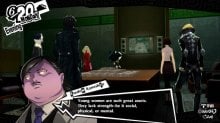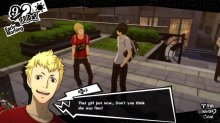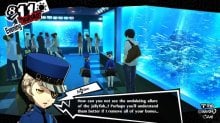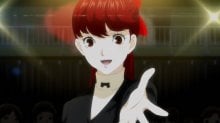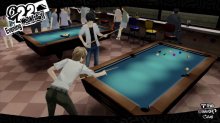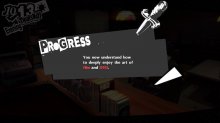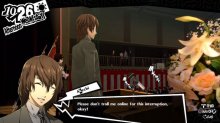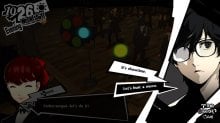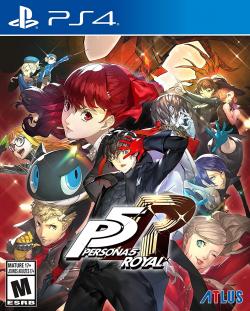 Persona 5 Royal (PlayStation 4)
Persona 5 Royal (PlayStation 4)
Official GBAtemp Review
Product Information:
- Release Date (NA): March 31, 2020
- Release Date (EU): March 31, 2020
- Release Date (JP): October 31, 2019
- Publisher: Atlus USA
- Developer: P-Studio
- Genres: Japanese Role-Playing Game
Game Features:
Persona 5 Ignoble
A common argument against certain videogames is that they're simple power fantasies. This criticism is usually used against military shooters like Call of Duty or over-the-top action games like the original God of War, and it argues that these worlds are shallow and unrealistic. They're stripped of any nuance to let the player feel powerful without introducing any complex emotions or repercussions to their actions.
Persona 5 is an interesting example of videogames as a power fantasy, in that you’re fighting for the oppressed and the downtrodden, but the world still lacks nuance and feels hollow. You play as a group of high schoolers with the ability to turn evil people into good people against their will, and decide to become crime fighters. It's very much a game of its time, with the people you target being used to tackle a lot of today’s hottest issues, like corporate greed or sexual exploitation by those in power. As a surface-level wish fulfillment scenario, it’s quite effective. Who wouldn’t get some satisfaction out of seeing these people filled with regret, forced to reckon with the consequences of their actions?
Unfortunately, Persona 5 isn't interested in exploring this premise to its fullest. The question that would spring to most people’s minds—is it right to brainwash evil people if it’s for the greater good?—is given some lip service, but that ethical conflict never spurs any real change in your characters or action in the plot. The villains are so cartoonishly evil, in order to justify the brainwashing, that they cease to feel like real people, which makes it impossible to take the pain they inflict seriously, or for them to reflect the realities of society.
The dungeons in Persona 5 (called Palaces) are physical manifestations of the villain’s mind, allowing you to understand them better through the symbolism in the Palace’s design. There's also a Shadow: the bad guy's alter ego, a representation of their darkest and most twisted desires. For example, the first storyline has you dealing with a famed former Olympian, Suguru Kamoshida, now a PE teacher at your school who uses his power and influence to get away with perpetrating physical, emotional and sexual abuse against his students. Kamoshida’s Palace turns out to be a castle where he is a king and all the students are his slaves. His Shadow is a cruel, wrathful king adorned in a robe and with a bikini-clad schoolgirl hanging off his arm. It’s an effective bit of imagery, but there’s nowhere for it to go from there. Kamoshida has already been established in the real world as a bully who enjoys his position of power. The castle confirms that he's an irredeemable egomaniac and things just remain that way, which makes the exploration of his Palace fairly one-note. You may discover a new depth to his depravity, but there’s no new angle, no deeper insight, because humanizing him would mean confronting the ethics of the brainwashing you’re doing.
Contrast that to the way Persona 4 handles its dungeons. It uses the same idea of making them physical manifestations of someone’s psyche, but instead focuses on repressed emotions. Take, for example, Kanji Tatsumi, an aggressive loner and street thug. Kanji’s dungeon is a steamy bathhouse and his Shadow is an overly flamboyant gay stereotype. Your first thought, of course, is that Kanji is a closeted gay man and this repression is causing his combative behaviour. That’s already a more relatable, human story than Kamoshida’s, but there’s a progression to it that encourages you to finish the dungeon. It turns out that Kanji’s family owns a textile shop, and he developed a knack for knitting at a young age, which led to him being mocked. He compensated for this by adopting an overly tough persona, but that lingering insecurity made him question his masculinity and, by extension, his sexuality. Whether Kanji is gay or straight is ultimately left unclear - it could even be that Kanji himself is unsure of his feelings - but he learns to accept whatever kind of person he is. And Kanji gets to stay around after the epiphany at the end of his dungeon, so we see how he grows from the experience and where it leads him.
But since Kamoshida is a criminal, he is arrested and his story ends after his dungeon. He, along with all the other villains, are never given a chance to become more than a caricature. (It’s worth mentioning that there is one Palace that operates much like Persona 4’s dungeons, focusing on a shut-in, and that Palace has by far the best design, with some clever choices that let us understand the owner better beyond the first impression of the Palace.)
Of course, there’s more to stories of abuse than the perpetrators, but Persona 5 stumbles in these areas as well. Let’s talk about Ann Takamaki, the character at the heart of the Kamoshida arc. Ann is pressured into trading sexual favours with Kamoshida to secure preferential treatment for a friend of hers on his volleyball team. When she eventually tries to set some boundaries with him, it’s heavily implied he rapes her friend as retribution. Ann's story works because it shows the way abusers isolate their targets and manipulate them into feeling partly responsible. Ann can’t tell anyone what Kamoshida’s been making her do because of how it would make her friend feel, and such a severe reaction to her setting boundaries is designed to make her feel guilty. It’s a promising start that paints a realistic scenario and explores the messy emotions caused by Kamoshida’s evil. There are some powerful moments here, but the impact is lessened as we see more and more of how the game treats Ann.
Ann is also a model, revered for her beauty, and, aside from the commentary on sexual abuse, a big part of her story has to do with the way people objectify her and can’t get to know the real her. Yet, the game revels in every opportunity to objectify her itself. She spends the majority of the game in a skintight, red leather catsuit (not of her choosing). Many, many scenes feature her being hit on, ogled or groped. One male party member is hopelessly in love with her and spends the entire game trying to win her affection. Another is introduced through a storyline where he desperately wants to paint her naked. Her biggest contribution to the plot is reluctantly agreeing to use her sex appeal to flirt her way past an enemy. It’s relentless. And the commonality among all of these is that it’s always someone else objectifying her, instead of Ann embracing her own sexuality.
But Persona 5 never portrays this as a bad thing. After all, most of the harassment comes from your other party members. That's nothing new, for Persona or anime in general, but it feels especially gross when it's being dumped on a survivor of sexual abuse who wants to be seen as more than just a pretty face. Now, in all fairness, there are one or two times where she reacts positively, but most of the time she either gets mad, is too tired to argue, or is somehow unaware the guys are even drooling over her. That last one in particular feels disrespectful towards what she goes through in the Kamoshida arc, but all of those non-reactions really just make sure the player can enjoy her objectification without having to feel bad.
Of course, there’s nothing wrong with sexuality being a major part of a character. Let’s contrast with Persona 4 again. Rise Kujikawa is a teen pop idol, and experiences most of the sexualization you’d expect to go along with that job. Her ads have her in skimpy swimwear, playing in a waterfall. When you meet her in person, she’s typically flirty and bubbly, unafraid to cuddle up to the protagonist or speak openly about the sexual tension in the group. The key distinction between Rise and Ann is that Rise takes an active role in her sexualization. Rise flirts with the protagonist because she enjoys it; Ann is forced into situations where she has to flirt to solve a problem. When the guys make comments about Rise’s body, she just accepts it and will talk about it; Ann is usually unreceptive, but unwilling to fight about it much. Rise’s introductory storyline also has nothing to do with her looks or sexuality, whereas Ann is introduced as a woman under the thumb of a man who reduces her down to her body, and despite making a show of breaking free from that, the men in her life (and the man writing her) rarely let her become more than that for the rest of the game.
The reason I’m spending so much time discussing the first storyline (aside from wanting to avoid spoilers) is that, despite its massive missteps, this case and the following one are easily the most interesting of the game. The first two cases are on a smaller, more personal scale, with the second focusing on a young man being exploited by his adopted father and mentor. It does some good work portraying the way abusers can single out helpless people, make their victim indebted to them and gaslight them into accepting, or even embracing, their abuse. But past those first two arcs, the scope expands and that personal touch is lost, as the focus shifts to bigger targets, such as the organized crime boss at the centre of the third arc. Because it tries to comment on society as a whole, it loses the character-focused nature of the first two stories and becomes more plot-dependent. Persona 3 and 4 (which share a writer/director with 5, Katsura Hashino) don’t have particularly strong plots, being dragged down by some abysmal pacing, repetitive dialogue, overlong expository scenes and awkward tonal changes. But they’ve always overcome those issues on the strength of their three-dimensional characters. As Persona 5 attempts to dazzle you with a conspiracy-laden plot full of twists and turns, like a bad B-movie, it sells out its biggest strengths and leaves you with the weakest parts of the other games.
This leaves most of the character work shunted off to the Confidant system. Confidants (equivalent to the Social Link system from 3 and 4) are small side-stories where you spend one-on-one time with people around town, some from the main story and some who only show up in their Confidant storyline, helping them sort through their personal problems. These have always been hit-and-miss, with both 3 and 4 having some wonderfully poignant ones and some woefully pointless ones, and 5 mainly straddles this same line, even if it misses more than it hits. Many of them suffer from the same melodrama as the main story, in that your Confidant is being obstructed by someone ridiculously evil, and you’ll take it upon yourself to perform a mini brainwashing. Some of the topics here could make for interesting stories—blackmail, domineering stage mothers, corruption in the media—but the bad guys are always cackling, gleefully evil supervillains, so it’s impossible to get invested in the emotional reality of your Confidant. Your Confidants need to be an innocent lamb to justify the forced brainwashing you do to their enemies, so there's no room for nuance. Most of the stories boil down to someone being trapped in a helpless situation and remaining static and inactive, waiting for you to save them with your magical powers. There's no self-discovery or acceptance, no personal growth, so these are really just the shallowest, wish-fulfillment parts of the game.
The Confidants that don’t have mini missions built into them generally fare better. Some are quite good, in fact. Helping a young artist rediscover his passion, getting a shut-in adjusted to life outside, reconnecting a stuffy (but well-intentioned) student council president with her student body. These are all simple, low-stakes stories, but they’re also deeply personal and, regardless of your experience with situations like this, the underlying emotions fuelling them are certainly relatable. They’re not perfect, and they don’t reach the heights of the best Social Links, but they’re at least on par with what the series typically offers.
As harsh as I’m being, I don’t think Persona 5’s writing is all bad. I love the personal touch and the messy subject matter of the first two arcs. This cast, even if they're shallower than previous Persona casts, all have unique voices and it’s fun to hear them bounce off of each other. Despite having arguably the darkest tone in the series, it’s probably the most successful in its comedy, partially thanks to the phenomenal voice work but also due in no small part to some unabashedly silly writing. Your party members get some decent character stuff woven into the main story, and most of their Confidant storylines work. The recurring villain is one of the best the series has produced yet, by being everything the brainwashing targets aren’t: sympathetic and three-dimensional, all while keeping up the series motif of being a dark reflection of the protagonist. There’s a lot to like moment-to-moment that keeps you engaged and hopeful that it may come together, but it rarely rises above being an enjoyable-but-shallow distraction. There’s nothing wrong with that, but it’s certainly not commensurate with the lofty heights the series has reached previously, the clear ambition present in the writing, or the time investment required to reach the end.
Persona 5 Royal
Given the unrealized potential in Persona 5’s script, I had high hopes for its expanded remake, Persona 5 Royal. Similar to Persona 3 FES and Persona 4 Golden, Royal primarily serves to expand the story and only offers relatively minor gameplay tweaks. Unfortunately, it just adds an extended epilogue rather than reworking what was in the original release.
The new party member, Kasumi Yoshizawa, is somewhat of a disappointment at first. She’s introduced as someone with the same powers as your group while standing in ideological opposition to them, and while that’s still true, nothing much comes of it. She’s strangely disinterested in her magical powers, and though she still vocally opposes your actions, takes little action to stop you (likely because this would mean reworking big parts of the original storyline), so nothing comes of the conflict. Her Confidant route fares better, staying grounded the way the best Confidants do, by focusing on her overcoming her sister’s death and her struggles to accept her limits. It ends up a little lighter in tone than you might expect given the subject matter, but it’s serviceable. Kasumi’s story really only pays off once you reach the new dungeon, Royal’s biggest addition, tacked on past the original end of the story.
While it doesn’t exactly slot in naturally (I think even people going into Royal blind will be able to tell this is an add-on made at a later date), it’s become my favourite Palace in the game. It tackles similar ideas as the previous final Palace—whether it’s better to live a happy life under someone else’s control or to live free and deal with the harshness of reality—but it resonates much better due to a more human, relatable villain and a stronger focus on the personal struggles of your party members rather than purely philosophical back-and-forths. It’s overwritten in the way Persona (and many JRPG) endings often are, which is especially harmful when the theme has already been covered in this game, but if you’ve put the hundred hours in to get to this point, it’s unlikely you’ll be deterred now. As mentioned, here is where Kasumi comes into her own, with her story tying in to the themes of the epilogue to give it a sense of urgency without overshadowing how it resonates with your original party members. Certain aspects of her story even parallel the dynamic of the protagonist and the original villain, giving new meaning to their relationship in a subtle way.
The new Palace also excels in its art and music. It’s a relief to see the new music and art stand up to scrutiny, as the original Persona 5 set an exceptional standard in these departments. Every inch oozes with style, strong reds and blacks providing a sharp contrast that make the colours pop. Nothing is designed haphazardly, with everything from dialogue boxes to the menu options thrown in at differing angles and sizes, creating this controlled chaos that catches and holds the eye. There are also plenty of fun details, such as the knife that pins the date on the calendar at the start of every in-game day, to keep things varied and interesting visually.
Shoji Meguro turns in a career-best score here. For a game of this length, the fact that the music never becomes repetitive or overplayed speaks to its variety and quality. Royal only helps this by adding more tracks that blend seamlessly to the original score, giving the music a little bit of a longer shelf life. Of particular note is the new battle theme: its opening notes immediately get you excited before it launches into an uptempo tune that amplifies the manic fun and kickass feeling of combat.
Despite being turn-based, the combat achieves that manic energy from the gleeful satisfaction that comes from exploiting its bounty of tactical options. The signature “1 More!” system returns here, meaning if you knock an enemy down (by landing critical hits or exploiting elemental and status effect weaknesses), the attacking character gets another turn. Baton Pass lets you pass your turn to another party member, meaning if there's another enemy they can knock down, you can pass the turn around to your entire party, recovering a little health and mana plus accruing bonus damage with each pass. If you knock down every enemy on the field, you can either do an All-Out Attack, a flashy attack that deals massive damage to each enemy, or a negotiation, where you end the fight by asking the enemy for additional money, items or power, at the loss of some XP (and the risk of the negotiation failing). Mana recovery items are sparse and you’ll need magic to get through the dungeons, so you need to pick and choose when to employ it, unless you want to leave and return another day. Add on top of this normal JRPG tactical concerns like balancing your budget or rounding out your party, and you’ve got a system where you’re constantly presented with choices and, even if they’re not always life or death, there’s still a lot of fun to be had from trying to maximize your gains.
This resource management is reflected in the life sim side of things. Each day gives you two time slots to perform activities, one in the day and one in the night (for some reason, whether you’re in school that day or not, you get one daytime activity regardless). Going to a dungeon counts as your daytime activity and heavily restricts your options for nighttime ones, which is why you want to complete the dungeons in as few days as possible. A lot of your activities will also raise social stats, which are needed to establish or advance certain Confidants.
Your Confidants are probably the main thing you’ll be pursuing in your free time, and if you’re not into their stories, there’s plenty of gameplay benefits to them. Persona 5 has a monster-collecting aspect to it, with the monsters acting as the main deciding factor in your combat stats and abilities. Each monster has a type (called “arcana”) that corresponds to one of your Confidants. When fusing these monsters together, you’ll get extra XP depending on the resulting creature’s arcana and how far along you are in the corresponding storyline. On top of this, each Confidant unlocks extra abilities for you. Party members will unlock battle abilities for themselves, but non-party members are still plenty useful. This even creates an unintentional dilemma at times, where I was torn between spending time with Confidants for gameplay reasons or story reasons. Do I hang out with the boring Shogi master who teaches me powerful battle tactics (like being able to swap party members mid-fight), or the more interesting former Yakuza who’s only going to give me a discount on my weapons? Some Confidants will even raise your social stats at every visit as well, which really gets you the most bang for your buck on each activity, increasing the pressure to make the most of your limited time. Should I focus on raising a stat to push through one Confidant, or should I raise that stat by hanging out with a different Confidant, taking longer to reap my ultimate reward but getting a heftier net gain? It’s a genius system that appeals equally to the artsy, story-minded RPG player and the more technical, numbers-driven RPG player, only held back by the fact that the quality of the writing doesn’t live up to the cleverness of the gameplay design.
Royal adds in several new activities that will raise your social stats, but also give you other unique combat bonuses. Examples include the Jazz club that teaches party members a new skill, the darts board that strengthens your Baton Pass or the billiards table that increases the damage bonus and knockdown rate of technicals. Royal also gives you more opportunities for events, as the original had a bad habit of arbitrarily taking away your nighttime activity for little reason. It still happens from time to time, but now most of those nights will let you stay home and raise a social stat, but not go out to rank up a Confidant. Even if the efficacy of your activities has been lowered to reflect these extra opportunities (hypothetically; I have no idea if they have or not), it’s still a better design as it keeps the momentum up and makes you feel like you’re making progress, which is surprisingly rewarding. And I think that’s the key to why this time management system works so well: each activity is rewarding on one or more levels, but there’s always more to do, something you’re giving up, when you make your decision so it never feels like an empty or meaningless reward.
There’s also great care given to the setting to give the impression of a full, real life for your protagonist. As mentioned, the game is broken down into days, and your available options change depending on the day of the week. Confidants will only be available on certain days, activities might be cheaper or more effective depending on the weather, some items can only be bought on Sundays, etc. Combine that with the accurate recreation of Tokyo for you to explore, and it’s easy to see how so many people (including myself, who’s lukewarm at best on the writing) can get sucked into this game for so many hours at a time. Even if the lack of depth to the writing can make the experience somewhat forgettable in retrospect, it’s hard to deny the addictiveness of this gameplay loop and reward system. There’s always something to look forward to in the calendar, just one quick thing you want to finish before you set the game down. The bustling metropolis is fun to explore and is overwhelming just when it needs to be, with plenty to find beyond the necessities if you want to go looking for it. The life sim and combat are a beautifully interlocking puzzle, with every system connected to another, every choice carrying true weight, and both are intimately connected to the story.
It’s hard to find a one-size-fits-all recommendation for Persona 5 Royal, since it’s so many different things to different people. For those who loved Persona 5 and want to revisit the world, it’s hard to imagine they won’t love this, as the additions only enhance the experience. For first time players, this is undoubtedly the one they should go with, as it’s the definitive version of the game, and it’d be a shame to invest a hundred hours into the original just to find out you didn’t get the full experience. If you already played Persona 5 but didn’t love it, this isn’t worth the double dip. As nice as the new stuff is, it’s all fairly minor (with the exception of the new Palace) and won’t be worth the time investment. And if, like me, you were disappointed by Persona 5 and were hoping Royal would be more of a fix for what was broken in the original, rather than just an expansion, you’ll be left disappointed this time around as well. Ultimately, Persona 5 Royal is just more Persona 5, and you likely already know if that’ll appeal to you or not.
Verdict
- Brilliant marriage between the dungeon crawler and life simulator halves of the game
- Gameplay always feels connected to the story
- Music and sound design is top notch
- Inspired and stylish visual design
- The new Palace is the best in the game
- Script is more plot-focused than is typical for the series, and loses much of its depth in this exchange
- Confidant stories are same and generally one-note
- Villains are one-dimensional plot devices rather than real people


